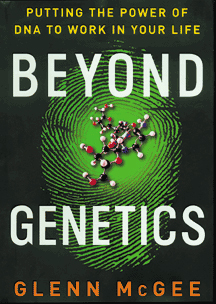An engaging, accessible guide to genomics and you.
By Dennis Drabelle

BEYOND GENETICS: Putting the Power of DNA to Work in Your Life
By Glenn McGee, Faculty.
Morrow, 2003. $24.95.
On the first page of his new book, Glenn McGee, associate director for education at Penn’s Center for Bioethics and assistant professor of medical ethics, philosophy, and history and sociology of science, helps account for his curiosity about genomics, the interface between genetics and computer science. Being adopted, he explains, has given him a kind of vested interest in inheritance, nature-vs.-nurture, and other aspects of human biology. But even readers with bloodlines that can be traced straight back to the Mayflower should find Beyond Genetics engaging. As McGee notes, genomics and the moral issues it raises are moving to the forefront of public debate.
“No middle class suburbanite will be without home DNA analysis in 2010,” he writes. “No impoverished African child will be treated by physicians in 2005 without first volunteering a DNA sample to make developed world genetics cheaper and better for the suburbanites.”
Already the nation of Iceland is immersed in an unprecedented study: except for those citizens who actively withhold their consent, every Icelander is participating in the compilation of a massive genetic database by a private American company, the ultimate purpose of which is to yield information for the benefit of humanity (as well as profits for said American company).
The medicine cabinet of the near future, McGee predicts, will contain not just drugs targeting certain symptoms or matched with specific diseases but “drugs made just for you and a few thousand people like you who have a particular gene. Not a headache gene, or a flu gene, but a ‘this person responds well to this drug’ gene.” At the same time, informed reading of a person’s genetic profile will allow her to build her own personal food pyramid.
Storing and manipulating such oceans of data will require enormous computer power, and here again McGee adds a personal touch, explaining how, when not using his laptop, he “lends” it to a researcher at Stanford University. The McGee machine spends its down time processing information about how proteins in cells “self-assemble or ‘fold.’” While its owner sleeps, his laptop moonlights.
This is arresting stuff, and McGee hasn’t even gotten to the big topics yet—cloning; genomics and infertility; and the case of Jesse Gelsinger, the young man who died during a gene-therapy trial conducted by Penn scientists. (The Gelsinger case, McGee argues, shows the need for comprehensive regulation of genetic research.) It’s a great deal of complex material to cover in a short book, but McGee generally contents himself with raising questions and framing the debate.
Thus, his approach to human cloning is not to bang a fist on the table but simply to wonder what “story” a parent would tell the clone by way of explaining their relationship. Constructing narratives about who we are and where we came from is an inveterate human tendency, and as McGee puts it, “The media stories of parental roles in cloning are frightening in almost all cases. One has parents replicating a child who has died early due to an accident. Another has an infertile woman seeking a genetic link to her recently deceased husband through a clone from a tissue sample she happens to have lying around. Still a third has a parent raising a clone of his wife to realize his dream of seeing his wife as a child. It is difficult to imagine how a family would form stories for such a mode of intimacy, birth, and connectedness.” This is an interesting take, all the more so because it, too, may derive in part from McGee’s background. Compare these rationales with the poignancy of the classic adoption story (parents sitting a child down and explaining, “We couldn’t have a baby in the usual way, but we wanted to love and raise a child, so we went out and found you”) and you don’t have much of a contest.
McGee is more definitive on the question of how much priority should be given to helping infertile parents produce children who are genetically similar to themselves. In other words, “how meritorious is the goal of producing a genetic relative, independent of whether or not it is the most frequent goal of Western parents?” Some proponents of a right to similarity, as it’s being called, want to classify infertility as a disease in order to raise it higher on the list of projects that deserve publicity, funding, and intensive research.
McGee’s reply is that society should direct scarce research dollars toward nobler endeavors than producing vanity children. An ethicist born to and raised by his progenitors might be more inclined to join the kids-should-resemble-parents camp, but McGee defends his position eloquently.
Beyond Genetics should not intimidate the lay reader. You don’t have to be versed in chromosomes and helices to follow McGee’s trains of thought. And by allowing glimpses into his personal life and its effect upon his work, he reminds us that philosophers are, after all, human beings with all the quirks and predilections attendant thereto.
Dennis Drabelle G’66 L’69 is a contributing editor of The Washington Post Book World.




